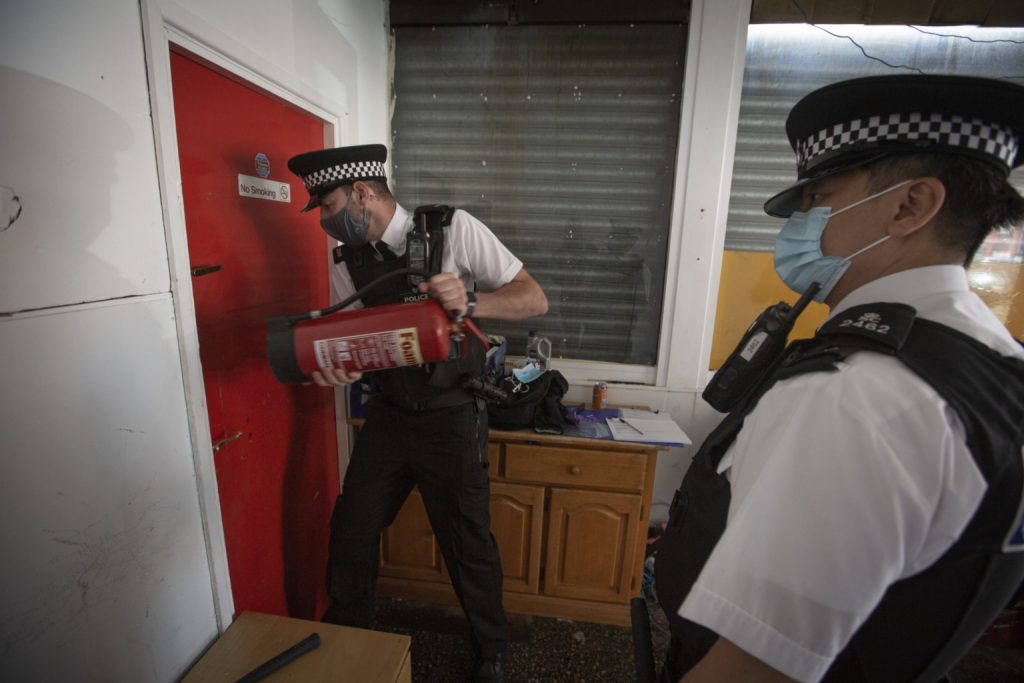Inside the raids revealing the ‘appalling reality’ of modern slavery in UK carwashes

Police officers breaking down a door whilst evidence gathering during a raid on a car wash in Picton Road, Liverpool co-ordinated by the Gangmasters and Labour Abuse Authority (GLAA). This part of Operation Bronco was multi-agency operation headed by the GLAA and supported by Merseyside Police which targeted the business in order to identify perpetrators and victims involved in the breaking of rules and laws around paying of the minimum wage and worker exploitation. The GLAA was a national enforcement agency whose role was to protect vulnerable and exploited workers in England, Scotland and Wales.
With a petrified look in his eyes, the carwash worker dropped his soapy sponge and ran down the street in panic when he saw police vans surround the forecourt. The only thought in the young man’s mind was to flee – yet he was one of the people the officers were there to potentially rescue.
For the specialists whose job is to find, stop and prevent modern slavery, this car-wash worker’s reaction is a common sight when they descend on the scenes of suspected exploitation.
The uppermost worry for many potential victims is being prosecuted themselves, especially if they are an illegal immigrant – and sometimes they have been indoctrinated by their bosses.
“He looked like a rabbit caught in the headlights,” said Martin Plimmer, of the Gangmasters and Labour Abuse Authority (GLAA), which led Operation Bronco at a car wash in Liverpool, last Wednesday.
i joined his team on its raid after it received a tip-off about suspected exploitation of workers. The allegations included that the employees were not being paid adequately, were being controlled by their bosses and had their identification documents taken away.
The operation, supported by police officers from Merseyside Police, culminated in three suspected victims in their late teens and twenties being safeguarded and taken to a reception centre where they are continuing to receive specialist support.
Two men – a 31-year-old Iranian national and a 24-year-old Iraqi national – were arrested on suspicion of committing forced or compulsory labour offences under the Modern Slavery Act. The GLAA also conducted searches of their addresses. They have since been released but remain under investigation.
With victims afraid to speak out, modern slavery is one of the most serious crimes but also one of the hardest to investigate. Police records revealed that the number of modern slavery offences increased by more than 50 per cent from 3,412 cases in 2018 to 5,144 cases in 2019.
This coincided with a 68 per cent increase in calls to the modern slavery helpline in the same period of time. However, this is believed to be the tip of the iceberg as many other cases go unreported.
There are myriad reasons why potential victims of modern-day slavery run as soon as they see police or members of the GLAA, explains Ian Waterfield, the organisation’s head of enforcement.
“Victims, particularly those who haven’t got a regulated immigration status, are fearful of authority,” he says.
“They think we’re only interested in their immigration status. But that’s not the case. First and foremost, they are victims and that’s all I’m interested in. We want to know their situation and how we can help them. Some of the stories we hear are truly horrendous.”
The tip-off came via a call to the Modern Slavery Helpline. “The people working at this car wash have no protective equipment or waterproof clothing,” Waterfield said.
“Our intelligence shows they are working 10 to 12-hour days, seven days a week with no breaks. We think there have been at least 12 workers here at various points. If you look at the number of cars coming through and the money coming in, it doesn’t add up.”
After the GLAA and the police surrounded the Liverpool carwash, the team’s first priority was to separate potential victims from suspected exploiters. Customers were asked to leave and the man believed to hold a supervisory role showed his anger as he was taken inside to be questioned.
One worker recounted to investigators how he had been transported to the UK in the back of a lorry, then the boot of a car, before beginning work at the Liverpool car wash.
“We ask carwash workers how they were recruited, how they came to this country, what they are paid and how they are treated at work,” said Martin Plimmer, a senior investigating officer for the North West.
Source: (I news)

